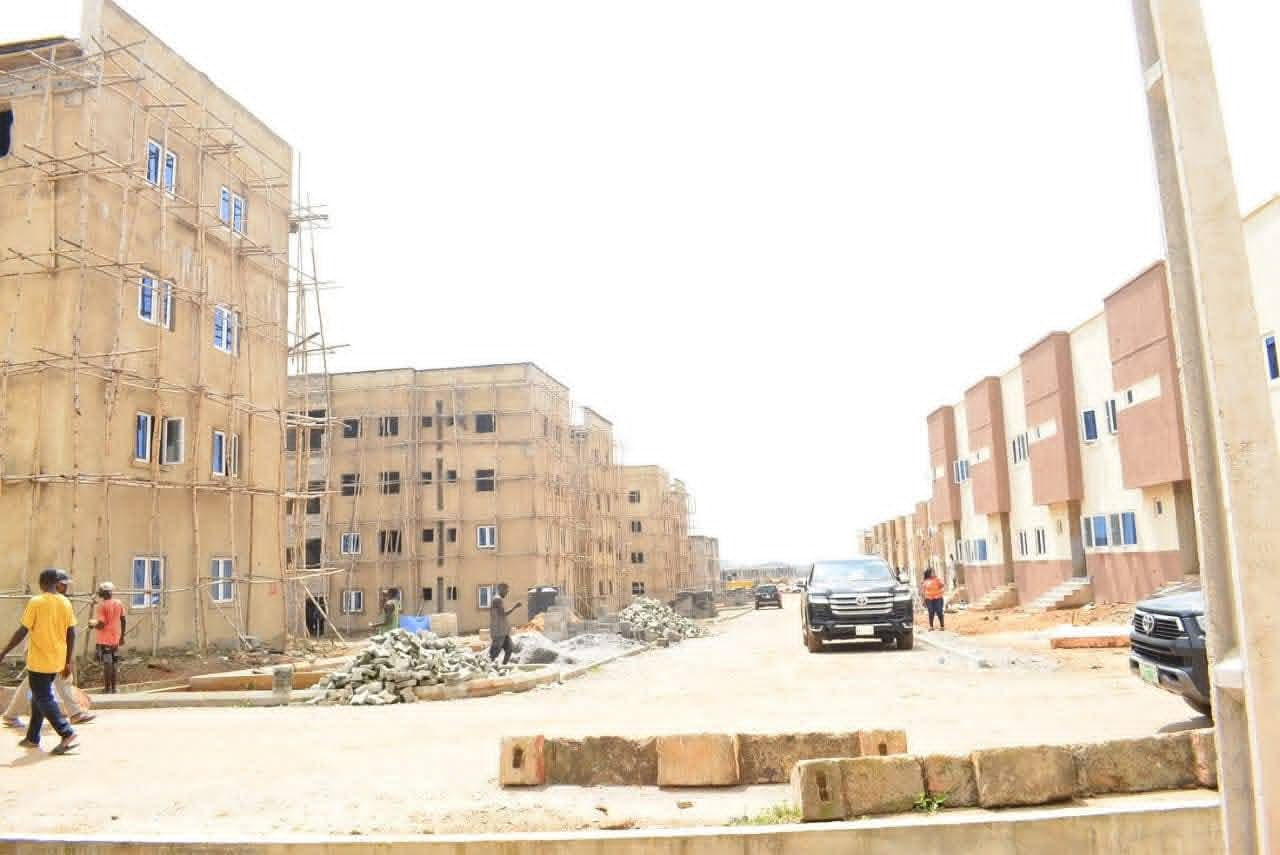If the housing market is to recover and grow, industry leaders insist Nigeria must move beyond fragmented efforts and adopt a coherent strategy that balances government leadership with private sector drive. While the state provides serviced land, infrastructure, and regulatory stability, developers, investors, and financiers must lead in delivery, innovation, and capital mobilisation, CHINEDUM UWAEGBULAM reports.
For decades, policymakers have acknowledged the country’s worsening housing deficit, estimated at more than 20 million units, yet successive interventions have fallen short.
Despite government estates, mortgage institutions, and revised housing policies, affordable housing supply still lags demand. The result is sprawling slums, overcrowded rentals, and millions of families unable to access decent shelter.
The Federal Government estimates that Nigeria needs to deliver at least 550,000 new homes yearly for the next decade to close the gap. Current output is nowhere near that target. Still, the market’s potential is vast. Housing contributes 5.2 percent to GDP, and real estate investment is forecast to reach N2.25 trillion by 2025, if structural barriers are removed.
Unlocking the bottlenecks
ONE of the greatest constraints is the availability of land. The Land Use Act of 1978, which vests control in state governors, was meant to ease access but has instead become a bottleneck. Complex procedures, overlapping claims, and exorbitant transaction costs discourage investors and slow projects. Unlocking land through reforms, digitised registries, and transparent allocation would boost investor confidence and reduce costs.
Finance is another stumbling block. With mortgage penetration below five percent and lending rates in double digits, homeownership remains elusive. Institutions such as the Federal Mortgage Bank of Nigeria and the Nigeria Mortgage Refinance Company exist but have limited reach.
Industry experts argue that financing must be broadened to include pension funds, insurance companies, diaspora remittances, and innovative schemes such as rent-to-own, shared equity, and micro-mortgages. Without affordable credit, even well-designed projects struggle to take off.
Rising construction costs compound the crisis. Inflation above 20 per cent and reliance on imported building materials mean budgets are constantly under pressure. Developers and policymakers are pushing for local alternatives, such as cement, tiles, roofing materials, alongside prefabricated and modular construction methods. Supporting domestic manufacturing would cut costs, create jobs, and enhance resilience.
The rental market, which absorbs the bulk of urban demand, also requires attention. With cities growing at over four percent annually, tenants face arbitrary rent increases, weak legal protection, and substandard units.
Experts recommend institutionalising rental housing through Real Estate Investment Trusts, upgrading stock, and enforcing tenancy rights to bring more order to the market.
Poor quality standards remain a critical weakness. More than three-quarters of housing stock is substandard, while frequent building collapses highlight regulatory gaps. Enforcing building codes, certifying contractors, and ensuring proper oversight are essential for safety and investor trust.
Assessing interventions
ALREADY, the government has launched initiatives to address some challenges. The Renewed Hope Housing Programme targets 50,000 units in its first phase, with over 10,000 already under construction across 14 states and the FCT.
The National Urban Renewal and Slum Upgrade Programme has also begun delivering infrastructure, roads, drainage, and sanitation in underserved areas. But Nigeria’s history of abandoned projects and shifting policies has eroded trust. Experts stress that only measurable targets, transparency, and continuity can restore credibility.
The private sector’s role is equally crucial. Too often, developers focus on luxury estates far beyond the reach of average Nigerians, leaving mass housing neglected. Government must therefore incentivise affordable housing through tax relief, infrastructure support, and streamlined approvals. Investors also call for secure land titles, predictable regulation, and reliable infrastructure to reduce risks and attract capital.
Immediate past president of the Nigerian Institute of Town Planners, Nathaniel Atebije, told The Guardian that low mortgage uptake stems from poor sensitisation.
He urged the government to expand awareness of financing opportunities through institutions such as the Family Homes Fund and mortgage refinance schemes. “Government needs to broaden and encourage refinancing sources such as pension funds and insurance companies,” he said. “At the same time, loan tenor must be elongated with lower interest rates.”
Atebije also advocates for incremental housing models that allow households to start with one- or two-bedroom units and expand as incomes grow. He urged the government to partner with foreign firms with proven technologies to establish modular housing factories across Nigeria’s geopolitical zones, while embracing green and circular construction practices. “Tax rebates on land and building materials, stronger research and development, and commercialisation of affordable local materials can reduce costs and make housing more inclusive,” he added.
Senior Lecturer in the Department of Estate Management, Obafemi Awolowo University, Ile-Ife, Dr Daramola Olapade, observed that most Nigerians avoid the mortgage system because of high interest rates, stringent lending conditions, and the focus of mortgage institutions on salaried workers, effectively excluding millions in the informal sector.
He added that the lack of documented land titles further limits access to collateral. “We must look at practical solutions, including alternative financial models, to expand access to affordable finance,” he said.
According to Olapade, one way to reduce interest rates is for the government to partner with financial institutions to develop more competitive rates backed by state guarantees that lower risk. He also called for streamlined mortgage processes, innovative mortgage products, and greater involvement of FinTechs in housing finance. “The primary mortgage institutions (PMIs) have failed in this regard,” he noted.
He urged policymakers to build on indigenous financial practices such as esusu and ajo to create cooperative housing schemes, and to encourage innovative public-private partnerships that combine government land and infrastructure with private sector capital to reduce delivery costs.
On land accessibility, Olapade emphasised that reform is critical. “People can build incrementally if they have access to secure land,” he said, urging the government to simplify title registration, cut bureaucratic delays, and deploy technology such as blockchain and GIS to improve land governance. He also called for urgent action to tackle the menace of ‘omo onile’ and land grabbers.
Highlighting the role of research, Olapade lamented that many findings on local building materials remain unused in university libraries. At Obafemi Awolowo University, for instance, researchers are developing an innovative, durable, and affordable three-bedroom bungalow prototype that could be replicated nationwide for under N10 million. “With the necessary funding, this project is achievable,” he said, urging government support for research and uptake of modern methods such as 3D printing, prefabrication, and modular housing. Subsidies and tax incentives, he added, could further encourage the use and production of local materials.
Olapade stressed that private developers, like all businesses, are profit-driven. The government must therefore create policies that make affordable and mass housing attractive. He recommended access to government land at subsidised rates, more flexible planning laws, and zoning reforms.
“For example, the minimum plot size in urban centres could be reduced from 300m² to 100m², as practiced in countries like Djibouti and Morocco. This would cut infrastructure costs per plot and expand supply within housing schemes,” he explained. The government could also provide direct infrastructure support, such as roads, water, and sewage systems in new estates, to ease developers’ burden.
Chairman of the Association of Capital Market Valuers (ACMV), Mr Chudi Ubosi, also stressed the importance of reforms and digitisation to simplify land access. “It will make land disputes a thing of the past or reduce them to a bare minimum. It will give comfort to lenders, ease foreclosure processes, and reduce litigation delays. Developers will access land more easily, while buyers and sellers will transact with greater confidence,” said Ubosi, who is also Managing Partner of Ubosi Eleh and Company.
Housing recovery as part of economic reform
ULTIMATELY, experts insist that housing recovery cannot be pursued in isolation. Ubosi emphasised the broader context: “What we need is holistic economic growth supported by an enabling environment where both private and public sectors thrive.”
Housing, they argue, is both a social good and an economic catalyst. Expanding the sector would stimulate jobs, boost manufacturing, deepen financial markets, and improve urban resilience. But achieving recovery requires political will, policy consistency, and genuine collaboration between government, developers, financiers, and communities.
Until Nigeria embraces this integrated approach, the housing dream will remain elusive. But with the right reforms and sustained commitment, the sector could yet emerge as a pillar of national growth and social stability.






